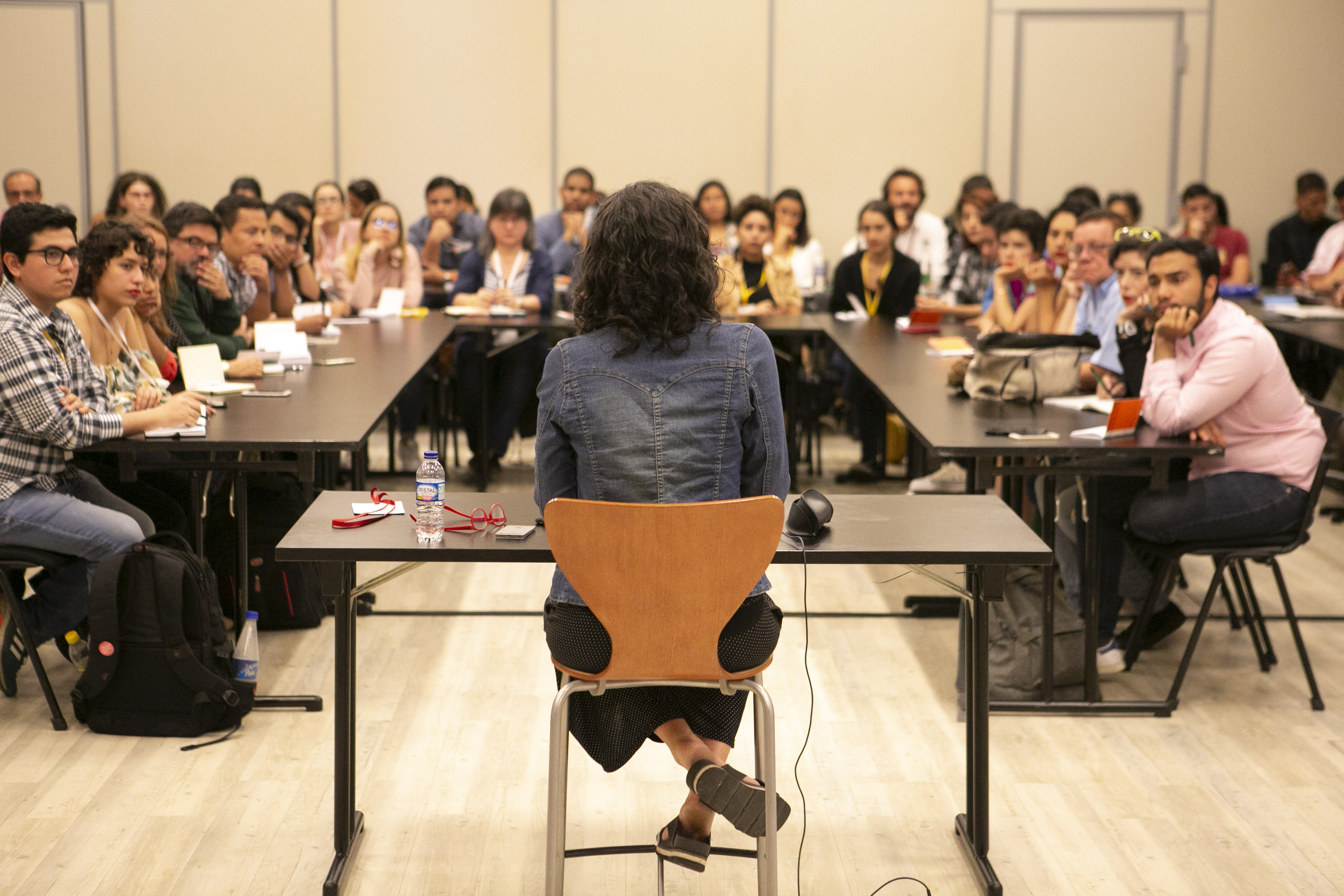Social cohesion in Latin America is part of the Gabo Festival conferences by virtue of the alliance with the EUROsociAL+ Programme, and its coverage is analysed by journalists from all over the region.

Foto: Fundación Gabo.
The Gabo Foundation, set up by journalist and Nobel Prize Winner in Literature Gabriel García Márquez, and the EUROsociAL+ Programme of the European Union, through its Democratic Governance area coordinated by FIIAPP, have formed an alliance that has started with a talk entitled, “Social cohesion in Latin America: What is the role of journalism?” held as part of #FestivalGabo 2021.
With an intergenerational perspective, during the talk, the philosopher Daniel Innerarity, a young man from the University of Chile, Lukas Quintero, and journalist Mónica González discussed the resurgence of uncertainties and fears caused by the COVID-19 crisis that is leading to polarisation of discourses and the need to articulate new social pacts.
Daniel Innerarity said that one of the practical problems of managing this type of crisis is that different actors have different interests and that “it is a challenge to reconcile a society in which different agents have different perceptions of risk and danger”. “There is plenty of capacity to say that we do not want something but little capacity for the political construction of what we do want,” he added. Regarding journalism, he pointed out the need to make a “good diagnosis of reality” and that “minor agitation” should be ignored in order to pay attention to people’s real difficulties.
Lukas Quintero talked about how young people have been mobilised in different parts of the region, remarking that “the sovereignty of the people is verbalised in the occupation of the town square, which is how it is made visible and society is represented”.
Chilean journalist Mónica González added that “while this toxic climate prevails on our continent, the need to protect democracy and citizens’ lives, regain public trust and find niches for social cohesion becomes more urgent”.
Workshop on covering the challenges of social cohesion
A few days after the Gabo Festival, the workshop ‘Coverage of the challenges for social cohesion in Latin America’ was held. Twenty-four journalists from the Latin American region, guided by teacher Mónica González and experts from the EUROsociAL+ programme analysed how to improve journalistic coverage to place social cohesion at the centre of the public agenda.
The workshop was opened by Jaime Abello, the general director of the Gabo Foundation, who advocated for journalism “that investigates and amplifies the proposed solutions, promotes confidence and hope, and counteracts the polarisation and misinformation that is fragmenting societies through an ethical vision and commitment to public service”.
The general secretary of FIIAPP, Inmaculada Zamora said that “The Gabo Foundation is a beacon, not only for journalism, but also for democracy,” stressing the importance of promoting active, informed citizenship through ethical training and stimulating journalists, inspired by the legacy of Gabriel García Márquez.
Mónica González explained why journalism needs to seek new perspectives to break down the collective fears exacerbated by the pandemic. Meanwhile, Sonia González, coordinator of governance at EUROsociAL+, stressed that social cohesion “is not on the public agenda” and that economic recovery “needs to focus on social aspects, with people at its centre.”
Seven key ways to improve journalistic coverage of the challenges of social cohesion
In the first session, some key points for improving journalistic coverage of the challenges of social cohesion were discussed:
- Humanise, not victimise. We need to understand that it is not enough just to move others emotionally, to outrage, to repeatedly report on the acts of violence and pain that mark the life of someone or their people. We have to assume that real commitment means addressing the reasons why such events should not be repeated and show how they exacerbate social divides.
- Find new ways to narrate age-old problems. Ever-changing formats and platforms force the media to find other ways to bring the public closer to daily content. Nevertheless, in the effort to achieve such a connection, we should not fall into the trap of morbid curiosity and superficial portrayal.
- Create community Despite the mistrust among citizens, the truth is that this exists among journalists as well. It is therefore necessary to promote transnational projects to make the common scourges that afflict the entire region more visible.
- Show some ways forward. At the crossroads of generating greater traffic and consumption of information, the duty to inform people through journalism should not be overlooked. It is not enough to say what has happened, it is crucial to unravel the origin of why it did and point to some possible solutions.
- Fight misinformation with quality research. Professional thoroughness has to prevail when preparing any type of content, no matter how simple the story may be.
- Do not encourage hate speech. The public’s mistrust and disaffection increases as inequality grows. Given such a scenario, there is an urgent need for journalism to explain without falling into activism or “do-gooding”.
- Overcome one’s ego. Journalists should put aside their thirst for recognition and isolate themselves from adopting a “hero” posture when retelling reality, so as not to intoxicate their work by trying to make themselves stand out solely through the rawness or beauty of contents.



